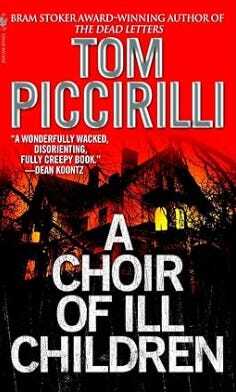New Top-Five Fav

I saw a meme the other day that said life was worth living in part because you never knew when you’d find you next favorite work of art. Yeah, yeah, yeah, I thought. Little did I know that my husband had been cruising the internet for a bunch of Southern Gothic horror for me. For a week, random books kept arriving: Michael McDowell’s Cold Moon Over Babylon. Karen Russell’s Swamplandia!. Tom Piccarilli’s A Choir of Ill Children.
I’d spent the summer mainlining McDowell—I’d already finished all of his Blackwater saga as well The Elementals—so I picked up Piccarilli. The first three paragraphs are worth a excerpt:
We move in spasms.
My brothers because they are conjoined at the frontal lobe, and me—because for me there is no other way to continue moving.
They have three throats and three bodies, three intertwined minds and many feelings, but only one voice. They even have a lover, Dodi Coots, who sleeps at the foot of their king-size bed with the back of her hand brushing Sebastian’s ankle. Her breath is tinged with bourbon, and chocolate, a few strands of hair wafting against the corners of her mouth.
I could keep going for the sheer pleasure of retyping Piccarilli’s prose, but I’ve made my point: it’s deliciously lyrical, deliciously strange, offbeat and off-putting and otherworldly in all the best ways. For the record, main character Thomas is describing his conjoined triplet brothers, who share both a head and a lover.
This is a bizarre novel. I mean that in a literary sense, as if the ghost of Hunter S. Thompson tried to channel the universe of Flannery O’Conner in a fucked-up Florida bayou. Events remain deliciously inexplicable, but in this novel, man is inherently depraved and fallen. There’s a dash of Harry Crews’s meanness and Faulkner’s wistfulness.
Page one took me in. Page three had me lost. By page ten, I was gone. This is a smorgasbord of Southern insanity, and I’m there for it. Thomas—the sheer guts of naming your protagonist after yourself!—is the scion of the richest family in town, and the owner of the mill. But a “storm of souls” is coming, and only he can stop it, maybe. There are ghosts wandering in the yard, naked men possessed by the Spirit, disconsolate preachers and carnival freaks. Whores and granny women populate the backwater town of Kingdom Come, its decaying mansion and Leadbetter’s Bar, with its biker gangs and maybe a murderous prostitute ghost? This is Florida Gothic of the highest order, utterly unhinged.
People complain, in the Amazon reviews, that they don’t get the plot. But the novel has no traditional linear structure; it moves in spasms, like the narrator warns in the first sentence. One of my favorite books is Absalom, Absalom!, and my other favorite recent read is Aimee Hardy’s upcoming Pocket Full of Teeth (Sept. 13, Running Wild Press), so I’m all the way there for non-traditional structure (I’m also in the middle of the book Hardy recommended on narrative structure, Meander, Spiral, Explode: Design and Pattern in Narrative). Linear narrative is overrated.
Don’t let the spasmodic structure make you think there’s no payoff, either. Amazing, shattering conclusion to this novel. Piccarilli is a genius, and I can’t wait to read the maybe-sequel, November Mourns. I also can’t wait to read A Choir of Ill Children again—something I seldom do with such a ridiculous TBR list.
If you’ve read and loved Piccirilli, and you know of anything even remotely approaching the strangeness of Choir, drop your recs in the comments.



